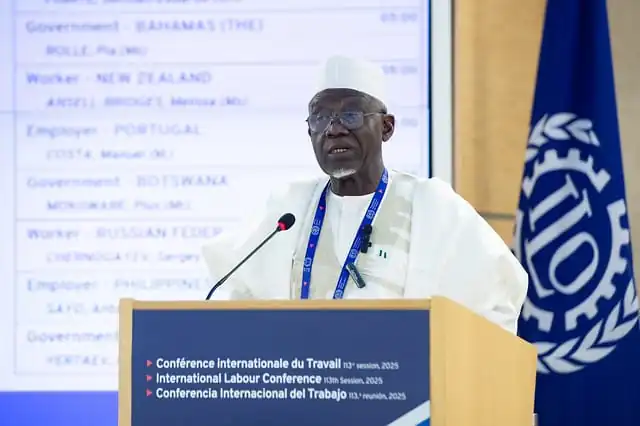Nigeria’s Minister of Labour and Employment, Dr. Muhammad Maigari Dingyadi, has defended the socio-economic policies of President Bola Ahmed Tinubu, describing them as instrumental in building a more equitable and inclusive society.
Addressing delegates at the 113th Session of the International Labour Conference (ILC), Dingyadi highlighted Nigeria’s alignment with the International Labour Organization’s (ILO) focus on job creation, human rights, and sustainable growth.
He praised Tinubu’s “Renewed Hope Agenda” as a national strategy built on pillars such as job creation, poverty reduction, access to capital, and anti corruption efforts all aimed at transforming Nigeria’s economy and society.
“The Agenda reflects our commitment to fairness and shared prosperity,” Dingyadi said, adding that Nigeria had officially joined the ILO’s Global Coalition for Social Justice to further these goals.

Among recent policy milestones, the Minister cited the approval of a new National Minimum Wage in July 2024, achieved through consensus with labour unions and employers. He described the move as a cornerstone of broader reforms focused on equitable wealth distribution and the promotion of decent work.
On efforts to tackle child labour, Dingyadi reaffirmed Nigeria’s status as a Pathfinder Country under the global Alliance 8.7 initiative. He said the government is revising legislation, enhancing institutional capacity, and rolling out community based rehabilitation programmes.
The Minister acknowledged the challenges posed by Nigeria’s large informal economy which accounts for over 60% of the workforce and said the government is rolling out targeted reforms including tax measures, support for micro, small and medium-sized enterprises (MSMEs), and digital registration schemes to formalize this critical sector.
Dingyadi also pointed to a revised National Employment Policy, as well as ongoing investments in digital skills and infrastructure under the National Digital Literacy Framework, as evidence of Nigeria’s preparation for a technology-driven future of work.
He emphasized Nigeria’s belief in tripartite dialogue involving government, employers, and workers as a path to lasting industrial harmony. “We have institutionalized regular consultations to strengthen labour relations,” he said.
Closing his address, the Minister called for stronger international collaboration to address global inequalities, climate change, security issues, and disruptions caused by technological shifts.
“We must come together to build a more inclusive, just, and sustainable world for future generations,” Dingyadi told the global audience.




